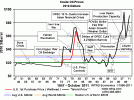Looks like U.S. Government "Sanctions" are again - back firing?
Exclusive: Iran wants euro payment for new and outstanding oil sales - source
http://www.reuters.com/article/us-oil-iran-exclusive-idUSKCN0VE21S
Fri Feb 5, 2016 - Iran wants to recover tens of billions of dollars it is owed by India and other buyers of its oil in euros and is billing new crude sales in euros, too, looking to reduce its dependence on the U.S. dollar following last month's sanctions relief.
A source at state-owned National Iranian Oil Co (NIOC) told Reuters that Iran will charge in euros for its recently signed oil contracts with firms including French oil and gas major Total, Spanish refiner Cepsa and Litasco, the trading arm of Russia's Lukoil.
"In our invoices we mention a clause that buyers of our oil will have to pay in euros, considering the exchange rate versus the dollar around the time of delivery," the NIOC source said.
Lukoil and Total declined to comment, while Cepsa did not respond to a request for comment.
Iran has also told its trading partners who owe it billions of dollars that it wants to be paid in euros rather than U.S. dollars, said the person, who has direct knowledge of the matter.
Iran was allowed to recover some of the funds frozen under U.S.-led sanctions in currencies other than dollars, such as the Omani rial and UAE dhiram.
Switching oil sales to euros makes sense as Europe is now one of Iran's biggest trading partners.
"Many European companies are rushing to Iran for business opportunities, so it makes sense to have revenue in euros," said Robin Mills, chief executive of Dubai-based Qamar Energy.
Iran has pushed for years to have the euro replace the dollar as the currency for international oil trade. In 2007, Tehran failed to persuade OPEC members to switch away from the dollar, which its then President Mahmoud Ahmadinejad called a "worthless piece of paper".
The NIOC source said Iran's central bank instituted a policy while the country was under sanctions over its disputed nuclear program to carry out foreign trade in euros.
"Iran shifted to the euro and canceled trade in dollars because of political reasons," the source said.
BOOST FOR EURO TRADE
Iran has the world's fourth-largest proved reserves of crude oil, and expects to quickly increase production, which could lead to tens of billions of euros worth of new oil trade.
Iran's insistence on being paid in euros rather than dollars is also a sign of an uneasy truce between Tehran and Washington even after last month's lifting of most sanctions.
U.S. officials estimate about $100 billion (69 billion pound) of Iranian assets were frozen abroad, around half of which Tehran could access as a result of sanctions relief.
It is not clear how much of those funds are oil dues that Iran would want back in euros.
India owes Tehran about $6 billion for oil delivered during the sanctions years.
Last month, NIOC's director general for international affairs told Reuters that Iran "would prefer to receive (oil money owed) in some foreign currency, which for the time being is going to be euro."
Indian government sources confirmed Iran is looking to be paid in euros.
Tehran has asked to be paid using the exchange rates at the time the oil was delivered, along with interest for those payment delays, Indian and Iranian sources said.
Indian officials are working on a mechanism that could involve local banks United Commercial Bank (UCO) and IDBI Bank for handling payments to Iran, one Indian government source said.
UCO CEO R.K. Takkar said the bank is involved in payments to Iran, but did not say if there were any plans to change the payment mechanism. IDBI CEO Kishor Kharat could not be reached for comment.
India could also try to resume payments through Turkey's Halkbank, a channel it stopped using in 2012, or by direct transfer to Iranian banks through the global SWIFT transaction network.
With Iran now again linking to international lenders through SWIFT, the NIOC source said it was easy for Tehran to be paid in any currency it wants, adding: "And we want euros."

